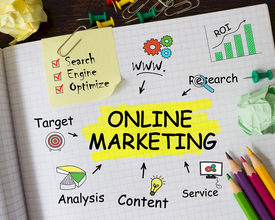If you want to promote your event, you can no longer deny online marketing. But you should be aware that there are hundreds of options for engaging online marketing. What are the best practices? We'll give you 12 tips for a successful approach.
Each event and every target audience has its own preferences regarding online communication. You should test the following 12 tips and find out what works best for your event.
1. Develop an effective hashtag and use it everywhere
Short, unique and easily recognisable. That's what defines a good hashtag. And that's why you should think hard on what your hashtag is going to be. If you have an annual event, you might want to add the year to the hashtag. As soon as you've found your ideal hashtag, you should start using it in all of your communication, both online and offline. Both on social media and outside of it: on your event website, in your invitational emails, on your posters… That is how your hashtag becomes familiar to your followers and that is how they will start using it themselves.
2. Add social share buttons to the bottom of the registration form
When people register or buy a ticket for your event, they're usually happy to do it. You should make good use of this in your confirmation message. You thank the attendee for the registration or ticket purchase and tell them that the event becomes even more fun if they bring a friend. That is why you ask them to share their attendance with their network. Add social share buttons with ready-made texts which make it easier for your attendees to share.
Here you can read more tips on how to use your own attendees as marketing tools
3. You should look further than just the classic social media
Depending on your target audience, Facebook, Twitter and LinkedIn should definitely form a part of your online marketing plan. And meanwhile, other social networks are becoming increasingly popular. Think about Instagram, Pinterest and Snapchat for instance. On those social media platforms, the competition is still somewhat limited, which makes it easier to stand out. Moreover, it's a way to reach a new target audience. Be mindful, however, to adapt your content by using the advantages of every medium (visual, textual, hashtags,…). Do not overestimate the value of social media. If you invest too much energy in them, you risk exceeding the return on investment.
Are you looking for more tips on social media and events? Watch the eventplanner.tv episode 'We Have to Do Something with Social Media #ButWhat?'
4. Look for (online) media partners
Develop commercial partnerships with parties for whom your event is also interesting or who address a similar target audience. Make a specific URL per partner with whom he promotes your event. That way, you can measure from which direction your registration or ticket sales are coming. In the case of smaller players, you can also consider affiliate marketing. In that case, you give your partner a commission fee per ticket sold. Large and professional media players will most often not agree to your affiliate offer, but they are however necessary if you want to reach your target audience and convince it of your own qualities. So you should definitely not leave out addressing the (professional) media for your target audience!
You should also ask your sponsors to pitch in. They too can have a large range.
5. 'Social' is key, also during and after your event
You should also strive to create a buzz on social media during your event. Take photos and make videos, gather quotes and short interviews and post these on Twitter, Facebook, Instagram… Don't forget your hashtag! Give a good example and encourage your attendees to be active themselves. You should also share their tweets and posts. Attendees will keep posting when they find out that there are many replies and likes on their posts.
Viewing tip: social media interaction on your event
Even after your event, you should make a follow-up on what happens on social media. You can learn quite a bit from it for the next time. This is also a unique opportunity to gather marketing material for your next edition. Talk to the authors of positive comments to ask them whether you can use their quotes for the promotion of your next event. It is best to do this in the weeks following your event. When the event is still freshly in their memories, they are a lot quicker to give their permission than when you ask them 10 months afterwards.
Viewing tip: Handling Social Media Peaks at Events?
6. Gather data and input with evaluations
If you handle it well, an evaluation can offer you quite a few opportunities. You know what attendees thought about your event and from their feedback you can gather new ideas and testimonies which can be useful for the marketing of the next edition. Use a checkbox to ask for explicit permission to use their quote. You should also ask for social media profiles, so that you can tag attendees when you post their quote. And if you do not yet have an opt-in for their email address, then the evaluation form is the perfect opportunity to ask for that opt-in.
7. Use SEA
Advertise in search engines such as Google and Bing (Search Engine Advertising). That way, you can advertise with a strong focus. However, keep a close eye on your budget, because costs can mount quite quickly. If possible, select a cost per lead (CPL) or cost per sales (CPS) formula. That way, you can immediately see what kind of revenue your campaign generates. New advertisers will not immediately be eligible for this. That is when the standard cost per click (CPC) offers the alternative. You can then still monitor the results in Google Analytics.
8. Make a video and find a clever way of spreading it
With a nice and professional video about your event, you will no doubt catch your audience's eye. After all, video stands out even more than text and photos. Also on social media. With nice footage, crisp editing, interesting information and inviting music, you can already give a preview of that which your attendee can expect on your event. Upload your video to Facebook, Vimeo and YouTube for a maximum reach. Embed the video on your own website and post a link to it on Twitter, LinkedIn, … You can also consider uploading short clips of it on Instagram. Don't make it purely commercial, but ensure that it is fun and that it especially captures the experience of your event or that it shares interesting knowledge. The chance of your video being shared will be bigger.
9. Engage your speakers or artists to promote your event
Your audience is coming to see the stars of your event, which are speakers or artists. You should interview them and ask them about their opinion on a certain topic. Use this input to make interesting content for your audience. You should also post it on your website or social media and link it to the websites or profiles of the speakers and artists themselves. You should also offer promotional material to your ‘stars’. A nice photo with their face, one of their quotes and the hashtag of your event, for instance. Something which they can share on their own channels. That way, you kill three birds with one stone: interesting content for your audience, promotion of your speakers and subscriptions to your event.
10. Barter
If your budget is limited, then bartering might be the right solution. In exchange for free tickets, visibility or participation, suppliers too may be willing to do something for you in return. For example, they might want to make photo or video material, write texts, promote your event using their own channels... Not everything has to cost money. For them, attending your event may be more valuable than sending an invoice. As long as you create real value for your partner and take into account the fact that venues, catering companies, ... will be less eager to take you up on your offer. After all, they receive that question almost daily and are dependent on that revenue. Dare to ask!
11. Make use of influencers
Influencers are people with a certain authority in their profession and with a large following on sociale media. Examples are bloggers, podcasters, YouTubers and social media 'stars' with masses of followers. Can you include them in your event? Then they will guarantee that their followers will also want to be a part of it.
Here you can discover how you can draw these influencers to your event.
12. Email marketing
Email marketing is not dead. Far from it. But if you use it wrongly, it will soon become a nuisance to your subscribers. Make sure you always include an opt-in, respect your subscribers' privacy and personalise so that your emails connect well to the interests of your subscribers. You should not view emails as a free tool to spam wildly. If you do, you will pay for it in the end.






